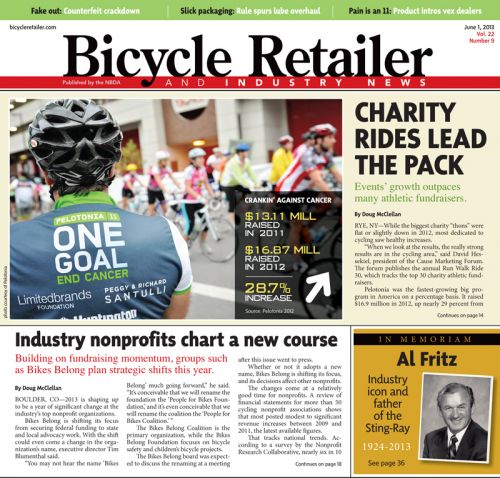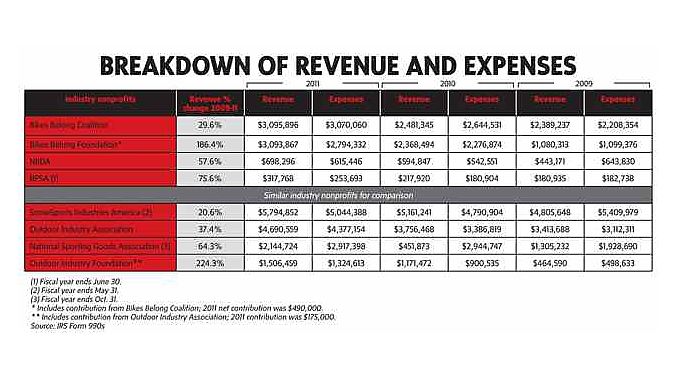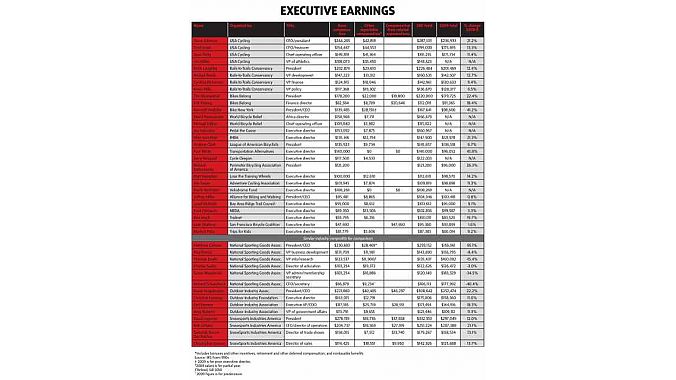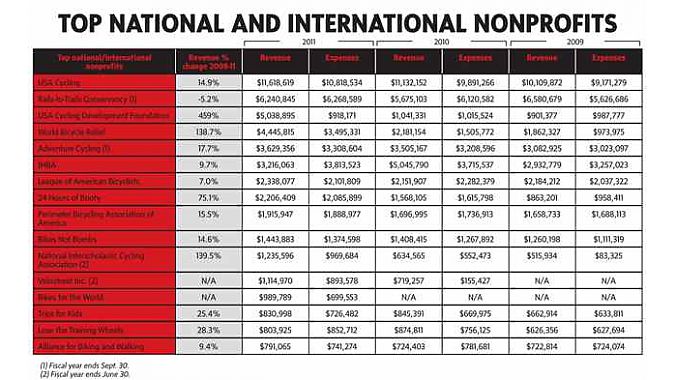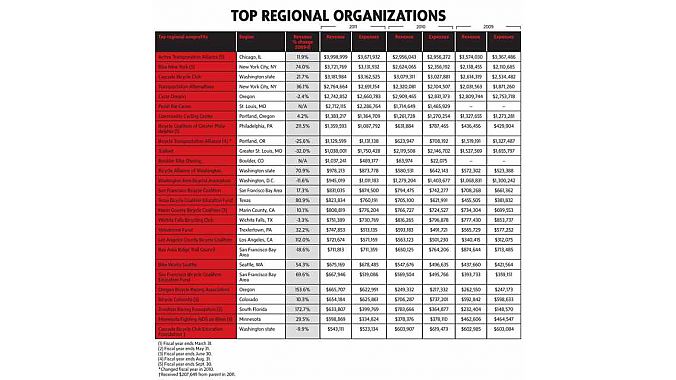BOULDER, CO (BRAIN) — 2013 is shaping up to be a year of significant change at the industry’s top nonprofit organizations.
Bikes Belong is shifting its focus from securing federal funding to state and local advocacy work. With the shift could even come a change in the organization’s name, executive director Tim Blumenthal said.
“You may not hear the name ‘Bikes Belong’ much going forward,” he said. “It’s conceivable that we will rename the foundation the ‘People for Bikes Foundation,’ and it’s even conceivable that we will rename the coalition the ‘People for Bikes Coalition.’ ”
The Bikes Belong Coalition is the primary organization, while the Bikes Belong Foundation focuses on bicycle safety and children’s bicycle projects.
The Bikes Belong board was expected to discuss the renaming at a meeting after this issue went to press.
Whether or not it adopts a new name, Bikes Belong is shifting its focus, and its decisions affect other nonprofits.
The changes come at a relatively good time for nonprofits. A review of financial statements for more than 50 cycling nonprofit associations shows that most posted modest to significant revenue increases between 2009 and 2011, the latest available figures.
That tracks national trends. According to a survey by the Nonprofit Research Collaborative, nearly six in 10 U.S. and Canadian nonprofits reported fundraising growth in 2012, the biggest percentage since 2006. More than 70 percent of survey respondents said they anticipated an increase this year.
Congress and the Internal Revenue Service require nonprofits to file an annual financial report, known as Form 990, which includes compensation details for key executives. The reports are public record.
However, they are best viewed over time. Because of IRS regulations, the Form 990 does not always provide an accurate look at a group’s operating budget for a single year. For example, the IRS requires a nonprofit to report a multi-year pledge as income in the year it is made, even if the funds are actually received and spent in later years. That leads to distortions for groups like IMBA and Rails to Trails that rely on long-term pledges.
Instead of deficits for Rails to Trails as indicated by its Form 990 for 2010 and 2011, for example, the organization actually posted an operating surplus of $628,000 and $139,000 for those two years, respectively, according to its audited financial statements.
CAUSE FOR OPTIMISM
As the industry’s most visible nonprofit, Bikes Belong has been setting a steady fundraising pace. From more than $6 million in revenue for the coalition and the foundation in 2011, Bikes Belong grew to more than $6.8 million in 2012, according to its unofficial figures. The coalition and foundation are on track to post combined revenues of about $8 million this year, Blumenthal said, after adjusting for transfers from the coalition to the foundation. Part of the increase this year comes from a dues increase that Bikes Belong charges its supplier members.
The organization’s focus is changing after an unsuccessful effort last year to merge with the League of American Bicyclists and the Alliance for Biking and Walking.
Bikes Belong is reducing its support to the League of American Bicyclists as it looks to build up its state and local efforts and become more visible to consumers, not just the industry.
Blumenthal said its People for Bikes campaign has starting building grass-roots support for bicycle advocacy and will be expanded.
“It’s pretty clear that we need more people with more clout to be part of a politically minded movement,” Blumenthal said. “We need it locally, we need it in states and we need it federally.”
League president Andy Clarke said the organization is looking to hold its own in 2013 after boosting revenue last year. From $2.3 million in 2011, the League brought in about $2.8 million in 2012 and ended the year with an operating surplus of $240,000.
“That counts as a good year for us,” Clarke said. But 2013 is going to be tougher. Bikes Belong did not renew its support for the League’s Bike Friendly Communities program, and Trek’s three-year, $1 million commitment to the League expires this year.
“We’re hoping to renew support from Trek, but we’re not sure if that will be happening again,” Clarke said.
The League is hiring a development director to help with fundraising.
“We’re blessed with a very engaged and active membership. We haven’t really begun to tap the attributes of our membership yet,” Clarke said. “As with other groups, we’ll be looking to support from companies outside the bike company world, because cycling is a hot commodity.”
At IMBA, executive director Mike Van Abel shares the nonprofit world’s optimism about 2013.
“We do have a large major donor pool, and I am seeing our individual major donors giving good-sized gifts already this year,” Van Abel said.
IMBA’s operating budget for 2013 is about $5 million, and the organization continues to work on expanding and revamping its network of regional clubs and chapters.
Two initiatives launched this year should help IMBA boost its visibility with consumers, Van Abel noted. One is a certification program for mountain bike instructors, while the other is an online mountain bike guide and trail map that launched in May.
Meanwhile, one of the industry’s fastest-growing charities, World Bicycle Relief, anticipates its growth will continue.
Created by SRAM co-founder F.K. Day, World Bicycle Relief saw its income more than double to $4.4 million from 2009 and 2011. The organization is seeking an executive director, who will be charged with boosting fundraising to $10 million over three years.
“We’ve been really excited to see the growth over the past two years,” said Matt Pierce, communications director for World Bicycle Relief.
The group has designed a rugged, easy-to-maintain bike it calls the Buffalo Bike that is specifically designed for use in rough conditions in Africa.
“Our fundraising goal is growing substantially, but it’s because we want to keep up with the demand for quality bikes in the developing world,” Pierce said.

